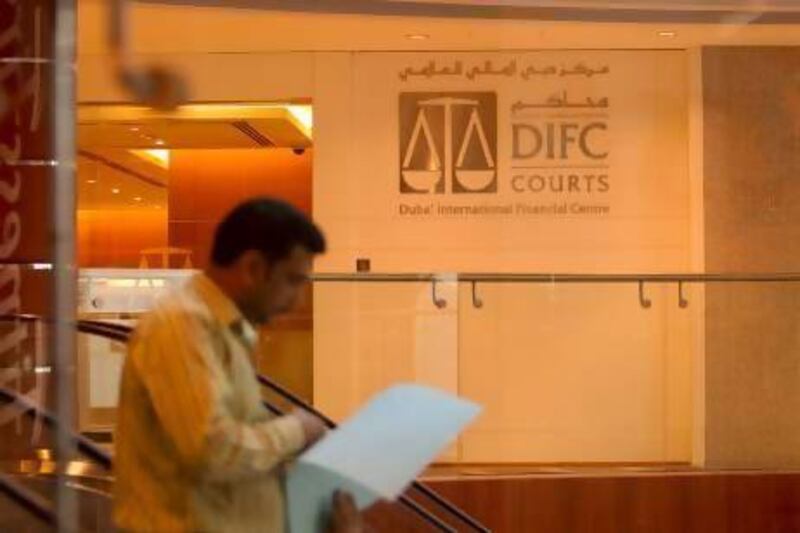Maha Al Mehairi seems to have always been destined for a career in law.
"I come from a legal family, half of us are lawyers of some kind. My father is a lawyer, who founded one of the big firms in the UAE; one of my relatives is a judge in the army. All our conversations at dinner are about the law," she says.
But Ms Al Mehairi might just go on to progress further within the legal profession than any of them. She is widely tipped in the Dubai legal community to eventually become the first female Emirati judge in the courts of the Dubai International Financial Centre.
It would be quite an achievement. While justice, as represented by the classical figure Justitia, is traditionally female, the law is very firmly male. The legal profession has always been regarded as a man's world, perhaps especially so in the Middle East.
If Ms Al Mehairi goes on to fulfil her potential in the DIFC system, it would be a unique event for the courts, and for the emirate.
She has already shown determination to get as far as she has. Her father - Hamad Mohammad Al Mehairi, the founder of the law firm Emirates Advocates - was steering her towards a career in legal practice. "I said I wanted to go for the judicial side. We are a competitive family," she says.
Ms Al Mehairi studied law at the University of Sharjah and then went on to gain an MBA from the Canadian University of Dubai. She clocked up another first by qualifying as an accredited mediator of the Royal Institution of Chartered Surveyors (Rics), the first Emirati woman to gain the prestigious qualification.
Michael Hwang, Chief Justice, said when she joined the DIFC Courts last year: "Having shown her potential, Maha is now in a position to advance her judicial career. Being the first Emirati woman to become an accredited Rics mediator is also an important achievement.
"The DIFC Courts' bench includes highly experienced international and Emirati judges: we now have another opportunity to nurture Emirati talent within the DIFC Courts' English language common-law framework."
That is quite an endorsement from the DIFC's most senior judge, but Ms Al Mehairi laughs off the suggestion that she is being "fast tracked" on to the judge's bench. "It is more an apprenticeship for being a judge, and will take eight years. That's not so fast." Her current role as a case progression officer involves her in the daily round of DIFC Courts business - sitting in on cases, assisting the judges with evidence and procedural matters and observing the judicial process. After five years, she will be able to judge cases in the court's small claims tribunal.
It is a form of ongoing informal training that will also take in visits to London and Singapore (two of the legal legal centres on which DIFC law is based) as well as visits to other Arabian Gulf legal centres, such as Qatar and Bahrain.
Why did she choose DIFC Courts rather than Dubai's wider judicial system? "I saw myself in the DIFC courts because I think it is going to boom over the next few years. It gives me experience of common law and case management, and the opportunity to learn from DIFC judges, who as a body have 250 years of experience behind them," she explains.
"We're handling cases from all round the world, involving some of the biggest disputes in the region, for example a recent case where members of the Kuwait ruling family brought an action against a Swiss bank. The Swiss were not happy for the case to be heard in Kuwait, and the parties agreed in DIFC. It shows that we are well equipped here to take on any case, and we are being proactive in dealing with each case that comes along," she says.
Ms Al Mehairi is not formally working on any of the cases involving the Dubai World Tribunal, but she says: "I do like to sit at the back and watch what is going on. It's such an interesting case. It shows in DIFC courts everybody is on an equal footing."
She is quick to point out that she is not the first, nor the only woman involved at a senior level of the UAE judicial system, but she hopes to set an example to other young Emirati women looking for a serious career.
"I hope it will encourage other women to take part in the judicial system, that would be very good," she says.
But she resists the idea that women should be brought into the legal system to give it a more feminine touch.
"We are not looking at the soft side of things, but I do feel women can master the detail of a case while still focusing on the bigger picture. Maybe women are better than men at multitasking," she adds.
[ fkane@thenational.ae ]





